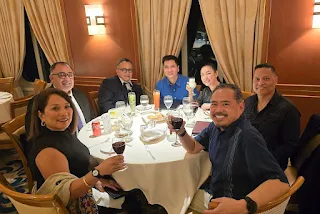📍 From Bundok to Boondocks: A Filipino Word Trending in the Headlines
If you've been on X/Twitter this week, you may have noticed that "boondocks" is trending—and not because of the animated series. Behind that internet slang lies a story of colonial history, language evolution, and—you guessed it—a Filipino word.
🇵🇭 The Filipino Root of “Boondocks”
The word “boondocks” actually comes from the Tagalog word “bundok”, which means “mountain.” During the American occupation of the Philippines in the early 1900s, U.S. military personnel adopted “bundok” to describe remote, mountainous, or hard-to-reach areas. Over time, it entered American military slang as “boondock”, eventually pluralized to “the boondocks.”
By the mid-20th century, the term had made its way into mainstream American English. Today, “boondocks” is used to refer to any rural, remote, or isolated area. It can carry a tone of condescension—implying backwardness or obscurity—but it also reveals how much American English has absorbed from its colonial history, especially in the Philippines.
bundok (Tagalog) → boondocks (American English)
“Highlands” → “The middle of nowhere”
📰 Why The Boondocks Is Trending After the P. Diddy Verdict
Today’s headlines are filled with reactions to the ongoing fallout surrounding Sean “Diddy” Combs, and surprisingly — or maybe not — The Boondocks is trending right alongside him. The reason? A legendary episode from 2005 that feels eerily relevant in 2025.
The Boondocks: Ahead of Its Time
In the second episode of the first season of The Boondocks, titled “The Trial of R. Kelly”, creator Aaron McGruder delivered a razor-sharp satire about celebrity worship, systemic injustice, and accountability within the Black community. And almost 20 years later, the parallels are impossible to ignore.
Episode Recap: “The Trial of R. Kelly” (2005)
The episode centers around the highly publicized trial of a fictionalized version of R&B star R. Kelly, who is on trial for urinating on an underage girl — a direct nod to real-world allegations and video evidence that emerged in the early 2000s.
Huey Freeman, the revolutionary and morally grounded main character, takes a hardline stance on justice and responsibility, while his younger brother Riley — a fan of Kelly’s music — defends the star blindly. In court, prosecutor Tom Dubois presents irrefutable evidence, but the trial ends in a not-guilty verdict. The courtroom erupts in applause, and the episode ends with Huey condemning the crowd for celebrating a predator because he can sing and dance.
Echoes in 2025: Diddy and the Cassie Assault Video
Fast forward to today. Sean Combs has been hit with a series of lawsuits and federal investigations stemming from Cassandra “Cassie” Ventura’s 2023 lawsuit, which accused him of abuse, trafficking, and rape. And then came the video — shocking footage from 2016 that showed Diddy physically assaulting Cassie in a hotel hallway. It left little room for doubt.
Fans online quickly drew the connection: We’ve seen this before. We’ve watched the same cycle play out — celebrity misconduct, public defense from fans, industry silence, and then slow reckoning. It’s the Boondocks prophecy, replaying in real life.
“Y’all laughed at Boondocks. Turns out it was a documentary.” – trending tweet
What Made the Episode So Powerful?
- It called out celebrity worship – The idea that fame excuses everything.
- It spotlighted victim-blaming – Especially when the victims are young Black girls.
- It showed how justice gets derailed – When culture cares more about a beat than a boundary.
The fact that an animated show from 2005 is trending today proves just how accurate and daring The Boondocks was. Aaron McGruder wasn’t trying to entertain — he was trying to wake people up. And many of us are only now realizing how loud that alarm was.
Maybe we should’ve listened the first time.
Want to Rewatch the Episode?
It’s streaming on Hulu and available on Adult Swim’s site. You can also find clips and analysis all over YouTube — just search: Boondocks R Kelly Trial Episode.
#TheBoondocks #Diddy #Cassie #Rkelly #AaronMcGruder #BlackCulture #Accountability
🌏 Colonial Echoes in Everyday English
“Boondocks” is just one of many words in English that have Philippine roots. Other examples include:
- Yo-yo — from the Ilocano word “yóyo,” meaning “to return.”
- Alae — a lesser-known root word, part of regional dialects used in older dictionaries.
While not every borrowed word becomes mainstream, “boondocks” is a clear reminder of how language travels—not just through friendship and trade, but through war, empire, and migration.
🧠 Language as Legacy
The irony? The term being used to describe Diddy's metaphorical downfall is rooted in the language of a country colonized by the very empire that exported global pop culture and hip-hop. The layers of history here are thick.
It’s fascinating—and a little sobering—to realize that a casual slang term trending due to pop culture drama is actually tied to Filipino mountains, Tagalog syntax, and a century-old occupation. Words hold stories, and “boondocks” is one of those quiet examples of how Filipino culture has shaped even the language of its former colonizers.
So the next time you hear someone say, “He’s out in the boondocks,” you can remind them that they’re speaking a little bit of Tagalog—whether they know it or not.
Did you know “boondocks” came from the Philippines? Share this post and drop a comment with other Tagalog words you’ve heard in everyday English! 🇵🇭💬
#FilipinoHeritage #Boondocks #Bundok #Tagalog #LanguageMatters #WednesdayWisdom











0 Comments
Hi! Thank you for dropping by. Please leave us a comment.